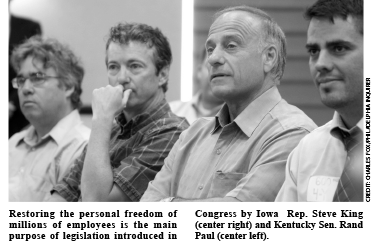Is This Any Way to Run a City’s Schools?
Leaked CTU Proposals Won’t Do Anything to Improve Schools’ Poor Performance
Bills Would Empower Workers to Refuse to Bankroll Unwanted Unions
(Click here to download the March 2015 National Right to Work Newsletter)
 As more and more members of the U.S. Congress cosponsor two National Right to Work measures that were introduced in the House of Representatives and the Senate early this year, union officials and their allies continue to invoke a make-believe world to justify perpetuation of Big Labor’s monopoly privileges.
As more and more members of the U.S. Congress cosponsor two National Right to Work measures that were introduced in the House of Representatives and the Senate early this year, union officials and their allies continue to invoke a make-believe world to justify perpetuation of Big Labor’s monopoly privileges.
In forced-unionism apologists’ alternative universe, ALL employees who are subject to union monopoly bargaining in the workplace benefit thereby.
Over and over again, propaganda campaigns against efforts to pass federal or state Right to Work legislation make this claim, either overtly or tacitly.
But reality is sharply at odds with the rhetoric of Organized Labor spokesmen and women.
Big Labor ‘Compression of Wages’ Potentially Puts Entire Business at Risk
Many employees who are forced by law to accept a particular union as the “exclusive” (monopoly) bargaining agent with their employer on matters concerning their pay, benefits and work rules clearly fare worse than they would if they were able to bargain on their own.
And many labor-policy specialists of all stripes have acknowledged as much over the years.
Take, for example, Richard Rothstein, a longtime research associate with the pro-forced unionism Economic Policy Institute, which receives much of its funding from union bosses’ compulsory-dues coffers.
In a research article published some years ago, Mr. Rothstein offered his own description of how the “compression of wages,” which he applauded as a blow for employee “solidarity,” works in practice:
“In [unionized] firms, wages of lower paid workers are raised above the market rate, with the increase offset . . . [in part] by reducing pay of the most productive workers. If firms with this practice are rare, competitors will be able to bid away their best workers.”
Not all of the skilled and conscientious production employees who get paid less as a consequence of being under a union contract are so fortunate as to find another job at a union-free firm where their abilities and efforts are better appreciated.
H.R.612 and S.391 Would Prevent Salt From Being Poured Into Workers’ Wounds
Those who are not so lucky stay at the unionized company, where a Big Labor “ceiling” limits the pay increases they can secure.
And in the private sector, federal law currently authorizes the firing of highly productive workers and other employees who are harmed by union monopoly bargaining if they refuse to pay dues or fees for detrimental union representation.
That adds insult to injury.
Fortunately, early this year Congressman Steve King (R-Iowa) and Sen. Rand Paul (R-Ky.) respectively introduced H.R.612 and S.391, national Right to Work measures that would prevent the salt of forced union fees from being poured into the wounds of employees inflicted by Big Labor monopoly bargaining.
“In 25 states,” noted National Right to Work Committee Vice President Mary King, “the economic and other harm wrought on employees by forced association with a labor union is now mitigated by Right to Work laws. These laws bar the extraction of compulsory union dues or fees from the employees who are harmed.
“And H.R.612 and S.391, otherwise known as the National Right to Work Act, would simply repeal the provisions in two federal labor statutes, the National Labor Relations Act and the Railway Labor Act, that authorize compulsory union dues and fee payments as a condition of employment.”
Committee Members Lobbying Hard to Build Capitol Hill Support For H.R.612 & S.391
“When forced-dues repeal becomes law,” Ms. King continued, “private-sector employees in all 50 states will have the freedom to choose as individuals whether or not to join or pay dues to a union, without facing job loss as a consequence of their decision.
“Restoring the personal freedom of millions of American employees is the direct and primary purpose of H.R.612 and S.391.
“This legislation wouldn’t add one word to federal law.”
The 2.8 million Committee members are now lobbying hard to build Capitol Hill support for the pending Right to Work measures, which have a total of 107 congressional sponsors as this Newsletter edition goes to press.

Leaked CTU Proposals Won’t Do Anything to Improve Schools’ Poor Performance

Wherever Big Labor wields the power to collect forced union dues, union bosses funnel a large share of the confiscated money into efforts to elect and reelect business-bashing politicians. Employment growth tends to lag as a consequence.

Members Insist They Keep Pro-Right to Work Campaign Promises